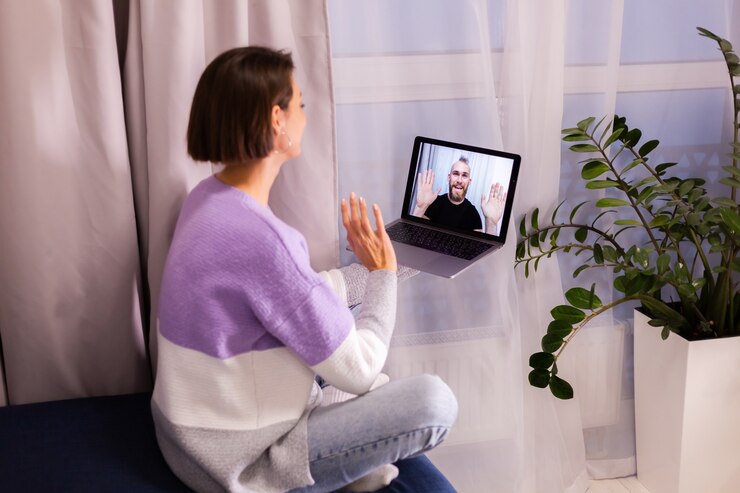With the rise of digital technology, mental health services have undergone a significant transformation. Online counseling, also known as teletherapy, is now a viable option for those seeking psychological support. It offers convenience, accessibility, and flexibility, making mental health care more attainable for many. As a result, the stigma surrounding therapy continues to dissipate as more individuals open up to the idea of receiving help remotely. Below, we explore how this innovative approach is reshaping the mental health sector.
Evidence-Based Practices and Effectiveness of Online Therapy Sessions![]()
Table Of Contents
There’s a common misconception that online therapy might not be as effective as traditional, in-person treatment. However, research indicates that teletherapy can be just as successful, utilizing evidence-based practices to produce positive outcomes for clients. Virtual therapy incorporates a range of therapeutic techniques that are proven to aid mental well-being, regardless of the medium of delivery.
For those seeking online therapy in specific areas, such as online counseling services in Baltimore, the experience is just as personalized and attentive. Therapists are equipped to overcome the virtual barrier, ensuring clients receive the highest standard of care, tailored to their circumstances and needs.
Cognitive behavioral therapy (CBT), for instance, has been successfully adapted to online platforms, enabling clients to learn and apply strategies to manage their thoughts and behaviors effectively. Similarly, other therapeutic modalities like dialectical behavior therapy (DBT) and mindfulness-based therapy can be administered virtually, providing clients with the resources they need for personal growth and healing.
Increased Accessibility and Convenience of Online Counseling![]()
The allure of online counseling lies in its accessibility. Those who previously had limited access to mental health services due to physical disabilities, chronic illnesses, or caregiving responsibilities now have the option of seeking therapy from the comfort of their own homes. This convenience has encouraged wider participation in therapy and has made continuous care possible for many who would otherwise find it challenging.
Another significant benefit is the elimination of travel time and associated costs. Clients no longer need to worry about traffic, parking, or the stress of arriving on time for an appointment. This reduction in logistical obstacles makes it easier to fit therapy into busy schedules, promoting consistent attendance and potentially better therapeutic outcomes.
The Privacy and Comfort of Receiving Therapy From Home![]()
Receiving therapy from home can significantly reduce the anxiety associated with seeking mental health support. In the familiar surroundings of their own space, clients can feel more at ease, allowing for a more open dialogue with their therapist. Home-based therapy allows individuals to create a safe and controlled environment where they can feel comfortable sharing their thoughts and emotions.
For some, the lack of physical presence in the therapist’s office can foster a sense of detachment that is conducive to frank and candid discussion. This distance can sometimes make it easier to discuss sensitive or difficult topics without the pressure that might come with a traditional face-to-face setting.
Furthermore, teletherapy allows clients to personalize their space in a way that can enhance their therapy experience. Whether it’s through the presence of comfort objects, lighting, or privacy settings, being able to control the environment can lead to a more beneficial therapeutic session.
Cost-Effectiveness and Insurance Coverage for Teletherapy![]()
The cost-effectiveness of teletherapy is one of its most appealing aspects. Without the need for therapists to maintain traditional office spaces, the overhead expenses often decrease, and these savings can be passed on to clients. Therefore, online counseling can be a more affordable alternative to in-person therapy for individuals on a tight budget.
Many insurance companies now recognize teletherapy as a covered treatment option, further reducing the financial burden on clients. This shift in coverage has made therapy accessible to a larger portion of the population. Inquiries about insurance policies and teletherapy coverage have become a standard part of the healthcare dialogue.
Reduced costs, however, do not translate to compromised quality of care. Therapists are trained to deliver the same high standards of treatment remotely as they do in person. Clients can rest assured that they are receiving professional and effective therapy while potentially saving on costs.
Altogether, the emergence of teletherapy has revolutionized the field of mental health, providing a breadth of benefits to both clients and therapists. Online counseling services offer a viable, effective alternative to traditional therapy, ensuring mental health care is more accessible than ever. With its cost-effectiveness, convenience, and adherence to evidence-based practices, online therapy stands as a cornerstone of modern mental health treatment.
